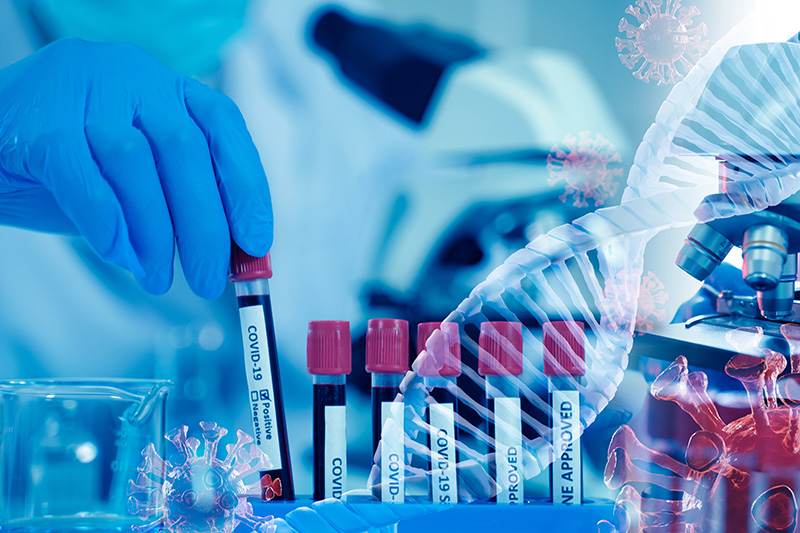1. The COVID-19 vaccine will be ready for distribution by the end of the year
The development of a COVID-19 vaccine has been a popular topic of discussion throughout the many months of the pandemic, but now more than ever many individuals are getting their hopes up for a fully approved vaccine by the end of the year – an unrealistic expectation. Even though we are getting closer to a successful vaccine, full distribution will not happen right away, and definitely not by the end of December of 2020.
Currently there are a number of existing trials for the COVID-19 vaccine, but a few of them are already on hold due to safety issues. Does this mean a longer wait for an approved vaccine? Maybe, but it’s worth the extra wait if the final product will be guaranteed as safe and successful. “People should be reassured by that, that that means we’re really looking at the safety issues with great scrutiny,” says Dr. Francis Collins, Director of the National Institutes of Health.
While we are all on edge waiting for normalcy to return, it’s important to understand that rushing the development of a vaccine may do more harm than good. It’s an extensive and intricate process which shouldn’t be taken lightly. Part of the process includes “assessments to ensure that a vaccine elicits an immune response and the gathering of laboratory and real-world evidence that this immunity will prevent disease.” In addition, the development process must also take into account long-term evaluations to ensure that the vaccine does not cause unexpected damage. As noted previously, even when a vaccine is made, it’s not a given that it will promise good results – at least not long term. Several trials will have to take place and waiting for possible long-term effects causes the wait to be longer. According to The Washington Post, “the Salk vaccine for polio was rushed, and improper manufacturing led to unnecessary deaths,” which is exactly what we want to avoid with this vaccine.
2. After a vaccine is approved, the pandemic will be over and things will “go back to normal”
Unfortunately, the thought of the pandemic magically disappearing as soon as a vaccine is distributed is one that may be too extreme. When most of the population does have access to the vaccine further down the line, “pandemic” may eventually be too strong of a word to describe the ongoing virus, but similar to influenza, a vaccine doesn’t mean the end of all pre-cautions.
“There is concern that the vaccines that are being developed will not have the very high immunogenicity that we see with measles or rubella. I think that the COVID vaccines will be less than perfect, though they will certainly give us some benefit,” Dr. John A. Sellick D.O., professor of medicine in the Jacobs School of Medicine & Biomedical Sciences at the University of Buffalo, explains.
We’ve had a successful flu vaccine for multiple decades and most individuals in the United States receive one each year, yet the virus still kills thousands annually and returns each season, usually in the fall and winter months. So ultimately, while we may become more ‘immune’ to COVID-19 at some point, that won’t be for a while. Even when that time comes, we will still need to take precautions such as proper hand-washing hygiene, disinfecting items such as cell phones and door knobs, and even wearing masks during flu/COVID-19 season, because a COVID-19 vaccine will not fully prevent you from ever getting the virus.
3. Herd immunity will protect you from the virus
Protesters against social distancing measures and state mask mandates often express their strong belief in herd immunity, but this theory is easier said than done. One problem with herd immunity is that the amount of people who must be protected against certain viruses and diseases varies from pathogen to pathogen. For example, Protection from smallpox requires that 95 percent of individuals be able to resist the disease, whereas 85 percent should be resistant to polio,” and measles with 80 percent protection. We have no way of knowing yet what the percentage would be for COVID-19. In addition, many individuals are still susceptible to such infections even if they were previously exposed or had become immune to it. The percentage of protection needed against COVID-19 is still unknown, which is one of many reasons why the idea of herd immunity protection should not be spread. Considering the waves of infection created by individuals who were able to contract the virus without any symptoms, counting on herd immunity to protect yourself and others from the virus is unrealistic.
4. The vaccine will be expensive
Many people fear that when a vaccine is available for all individuals, another obstacle such as cost will arise and they won’t be able to further protect themselves and their family members. However, the Centers for Disease Control and Prevention has stated that cost “will not be an obstacle to getting vaccinated.” The vaccine will be purchased with U.S. taxpayer dollars which makes it possible for Americans to get it at no cost. Although there are some providers that may require a fee for administering the shot, most insurance companies will be able to provide you with the payments needed to receive the vaccine. The CDC even stated that those without health insurance will be able to receive the COVID-19 vaccines at no cost.
5. COVID-19 is like the flu, therefore if you get the flu vaccine you won’t have to get a COVID-19 vaccine/you’ll be safe from contracting the virus
It’s widely known that COVID-19 and Influenza have very similar symptoms; people often mistake one for the other, but the two viruses also have many differences as well and you should not expect one vaccine to fully protect you from both viruses. In fact, the CDC stated that getting a flu vaccine will not protect against COVID-19. However, getting the flu vaccine, may help reduce risk of flu symptoms, such as respiratory problems, that could end in hospitalization. It may be even more useful for those with chronic health conditions, pregnant women, and children. Overall, the flu vaccine will not prevent you from contracting COVID-19 but it certainly doesn’t hurt to get one in order to prevent further sickness.
There’s no question that society will re-open again someday, but things will never be the same as they were before the pandemic – and that’s not necessarily a bad thing. Hopefully we will continue to make major changes during this outbreak and come out of the pandemic with a safer new normal.



